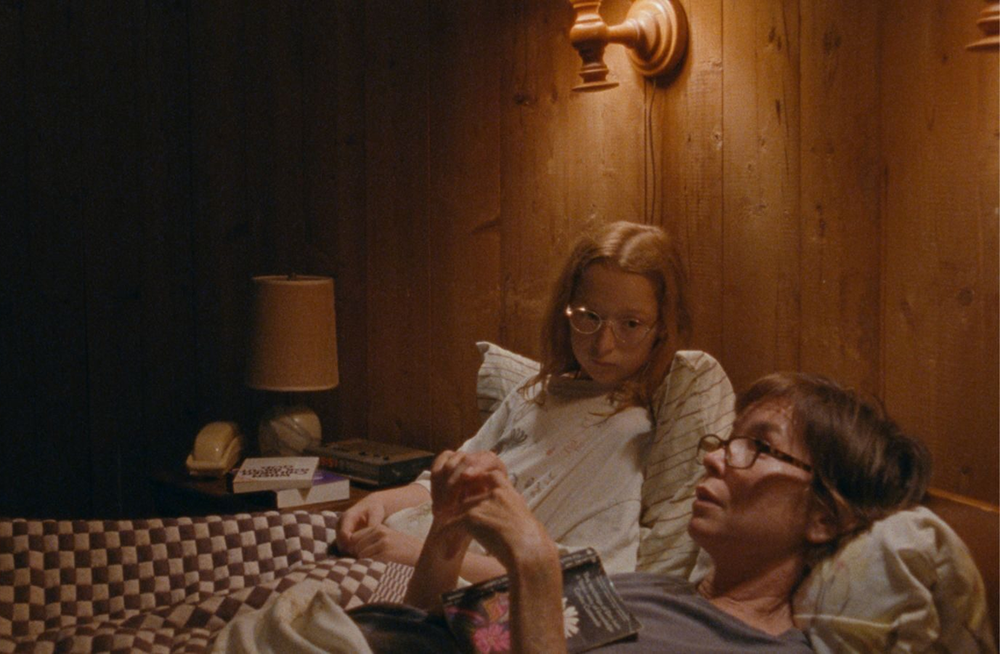To mark the New York premiere of Annie Baker’s “Janet Planet,” the writer/director programmed a 17-film series, titled “Angels and Puppets: The Stage on Screen with Annie Baker.” The eclectic selection, ranging from a delectable, leggy Vincente Minnelli musical (“The Band Wagon”) to the iconic dinner-date two-hander “My Dinner With Andre” suggests a roaming imagination and omnivorous cinematic appetite. Wider influences notwithstanding, in “Janet Planet,” the Pulitzer-Prize winning playwright Baker hovers meticulously on the inner lives and conflicts of a two-person family unit. Single-mom Janet (Julianne Nicholson) holds on tight to her individuality while her precocious (“Every moment of my life is hell”) daughter Lacy (Zoe Ziegler) both embraces and resists growing apart from her mom. Often blissful, sometimes frustrating, Baker’s fitfully ambitious debut tracks the seismic changes that seemingly ordinary moments can instigate over the course of an especially average summer.
The subject matter isn’t explosive, and the packaging isn’t revelatory, but Baker’s eye for dreamy, woodsy visuals and empathy for eccentrics echoes Kelly Reichardt’s irresistible “Showing Up.” And with Lacy, Baker’s introducing yet another fiery, ennui-laced hero into the coming-of-age canon. Ziegler’s tender portrayal splits the difference between Jason Schwartzman’s prep-school punk Max Fischer (“Rushmore”), and Anna Paquin’s unflappable Flora McGrath (“The Piano”). Lacy owns the screen in all her scenes, but, to her distress, the world she inhabits belongs to more than just her and Janet. Baker divides the film into three separate acts, all titled after a supporting character. First, we have Wayne (Will Patton), Janet’s unstable, inexpressive boyfriend, then Regina (Sophie Okonedo), an old friend and transient, rent-free tenant, and last, it’s Avi (Elias Koteas), a leader of a theater troupe (Janet: “It’s not a cult exactly …”)—and Regina’s ex—who then courts Janet.
A Film Bursting with Humanity
Baker lingers on the present—which is for this story is the 1990s—and only glances back at the past when absolutely necessary. At times the casual attitude towards personal details (Janet’s dad was a holocaust survivor who left her $30,000 to “start a new life”) feels flippant, an underinvestment in character. (I also couldn’t help but wonder how Janet’s fledgling acupuncture practice funded such a swoon-worthy, Airbnb-ready farmhouse.) But, that withholding strategy serves another purpose: to center the abundant love and private jokes/pleasures/pain between Janet and Lacy. Like any life, there is excitement, boredom and the in-between, and Baker’s focus on the latter does halt momentum. But, Baker doesn’t waver, presenting a career’s worth of ideas—on caretaking, holding on, and letting go—into her first feature, and the sum total is a full film, bustling with humanity.

Any life offers ample room for heightened effect and melodrama, and to Baker’s credit she withdraws at the moment when conflict threatens to boil over. Regina moves out after a heated exchange in front of Lacy. And Avi is dispatched in a cagey disappearing act which volleys back from Avi and Janet to Lacy at home eating a blintz (“…without the fruit”), staging a play with her wooden figurines. Janet and Lacy’s planet is both too big and too small to allow room for anyone else. In the final scene, mom and daughter are together again, accompanying Janet’s friend to a dance hall, where Janet square-dances and the curtain drops on Lacy’s inscrutable face, exuding enigma and curiosity. Lacy’s face curls to a smile then pulls back, representing the existential battle between hope and despair, familiar to anyone who has been an 11-year old.
Inspired Sets and Transcendent Leads
Nicholson and Ziegler are transcendent leads whose co-dependent bond determines the fate of their lives, and the film. And while it sometimes seems like we’re on the outside looking in, perhaps that’s not to the detriment, because like Wayne, Regina and Avi, this is a duo that won’t allow a third wheel to slow them down. Baker’s rendering of small-town life in the ‘90s is so specific and inspired—casting Patton (“Armageddon”) and Koteas (“Crash,” “Exotica”) and featuring the “Clarissa Explains It All” theme songs are all clever, effective time warps—it rises above the trope of small-scale, intimate memory piece to essentially ask us, “Do you remember?” or rather, “What do you remember?” Implicating is the opposite of excluding, and while Janet and Lacy’s journey belongs to them, Lacy’s arc, neither a defeated puppet nor a blossoming angel, implies that the best and worst are yet to come.
Annie Baker’s “Janet Planet,” an A24 release, is now playing in New York, and opens nationwide June 28.